From July 28 to 31, 2025, the July Consultation Meeting for the Global Food Systems and SDGs Report concluded successfully. Organized by the Secretariat of the World Shiology Forum, the meeting focused on the core content of Chapters 1–9 of the Report, featuring eight thematic discussion sessions. It brought together more than 50 leading experts and scholars (including domestic participants) from over 40 countries worldwide. Through in-depth discussions, the participating scholars contributed valuable insights to enhance the report’s academic rigor, global perspective, and practical relevance, significantly advancing the refinement of this critical report on the future of global food systems.
The meeting was chaired by Ms. Zhang Zhengzheng, Deputy Secretary-General of the World Shiology Forum. Experts engaged in lively and constructive discussions on key topics such as global food security, sustainable agricultural development, and region-specific challenges. The Secretariat recorded all comments and recommendations in full. The drafting team will subsequently refine the Report based on the Shiology theoretical framework and a problem-solving approach to achieve systematic improvements.
To accommodate time zone differences, some experts who were unable to participate in group discussions actively provides feedback and suggestions through email and one-on-one exchanges. They not only affirmed the soundness of the current framework but also offered in-depth perspectives on key issues such as the localization pathways of Shiology theory and mechanisms for international cooperation, providing diverse viewpoints to enhance the Report’s global applicability.
Expert Recommendations: Multi-Dimensional Strategies to Improve and Upgrade the Report
1. Structure and Presentation: Enhancing Readability and Professionalism
Experts recommended strengthening the logical connections between chapters, adding summaries at the end of each chapter and abstracts at the beginning, and standardizing the writing style to ensure consistency. They also suggested enriching visual tools by including national comparison radar charts, SDG conflict matrices, and color-coded world maps clearly indicating differences in governance groupings, to improve information accessibility. Further, they proposed that the report should clearly define key terms, include a glossary and reference section, and reinforce academic rigor through standardized citations.
2. Data and Regional Adaptation: Balancing Comprehensiveness and Specificity
Experts called for the establishment of a “data completeness” grading system, with transparent sourcing (e.g., FAO, World Bank) for all datasets. For data-scarce regions such as Small Island Developing States (SIDS) and low-income areas in Africa, they suggested developing low-cost data collection tools and promoting the involvement of local experts.
In regional analysis, recommendations included separating the Caribbean region from Latin America for independent study; adding a dedicated section on “climate-adaptive agriculture in island nations”; highlighting fisheries management experience in SIDS such as the Maldives; supplementing case studies on the impact of conflicts in Sub-Saharan Africa on food systems; and deepening analysis of local practices in developing countries across Asia, Africa, and Latin America.
3. Content Deepening: Focusing on Sustainability and Equity
Production and Ecology: Pay close attention to the soil degradation crisis in densely populated countries (e.g., 76% of Bangladesh’s land faces degradation), incorporating the “One Health” approach (soil health → crop health → sustainable production) into the analysis. Systematically assess the impacts of extreme events such as wildfires and armed conflicts on agriculture, along with resilience strategies.
Supply Chains and Storage: Include “water source pollution” and “storage system vulnerability” as core risk assessment indicators; promote dehydration technology and cold-chain alternatives to address post-harvest losses in areas with limited electricity.
Policy and Governance: Adopt cross-sectoral governance models like Indonesia’s "BRYN Initiative" to promote cross-sectoral collaborative governance; strengthen the application of the “think globally, act locally” framework to balance free trade with national food security.
Culture and Special Needs: Incorporate religious and cultural dietary requirements, such as halal food standards, and promote awareness of import regulations via television and short films. Advocate for systematic K12 food education curricula to improve public food literacy.
4. Implementation Mechanisms: Translating Theory into Practice
Experts emphasized transparent case selection, prioritizing replicable success models from developing countries (e.g., Brazil’s “Zero Hunger” program). They proposed building “academia–enterprise” collaborative innovation platforms to accelerate the application of technological achievements, and developing national-level food systems data dashboards to ensure policy recommendations are actionable, measurable, and trackable.
Next Steps: Continuous Refinement and Publication Roadmap
The Secretariat will implement a phased revision process: finalize feedback collection by August 20, hold the final round of discussions on August 31, complete the final draft by September 25, and officially release the Report in October. As a three-year flagship project, the Report will continue to be updated with new data and expanded case studies after publication, with the goal of becoming an authoritative reference for guiding the sustainable development of global food systems.
The successful convening of this July Consultation Meeting brought together top global expertise, laying a solid foundation for refining the Report. Through collaborative efforts of international experts, this academically rigorous and action-oriented report will provide will provide essential support in addressing complex global food security challenges and contribute to achieving the United Nations Sustainable Development Goals (SDGs).
Experts Participating in Each Session (Sort by Number of Sessions Attended)
Session One:
Bahrain: Islam H. Elghonaimy, University of Bahrain, College of Engineering – Postgraduate Studies Coordinator
Croatia: Alma Harašić Bremec, Association of Chefs from Mediterranean and EuropeanRegions – Culinary Academy Manager
Slovak Republic: Lubica Bartova, Slovak University of Agriculture in Nitra, Faculty of Economics and Management – Full Professor
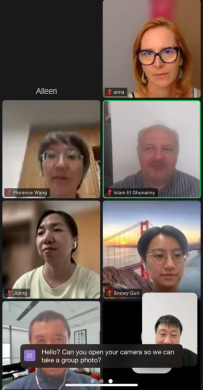
Session Two:
Pakistan: Kaleep Kumar Oad, M.Phil Scholar – Rural Development,Faculty of Agricultural Social Sciences,Sindh Agriculture University
Bolivia: Jorge A. Rojas-Beltran, Director of the "Center for Biotechnology and Nanotechnology" (CByN) of the Mayor de San Simón University (UMSS)
Qatar: Elmogiera Elawad, Survey Operations Manager at the Social and Economic Survey Research Institute (SESRI),Qatar University
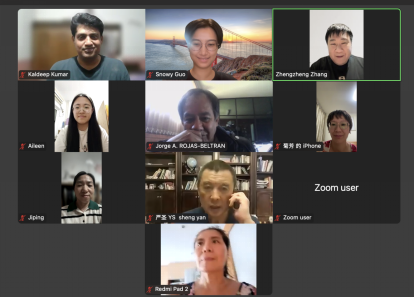
Session Three:
Brunei Darussalam,Hong Shyang Pei, Universiti Teknologi Brunei – Assistant Professor
Iran,Ali Yassoralipour, Universiti Tunku Abdul Rahman (UTAR) – Assistant Professor
Maldives: Ahmed Riyaz Jauharee, Dean of the College of Fisheries and Ocean Sciences,Maldives National University
China: Duan Yuquan, Researcher, Chinese Academy of Agricultural Sciences; Member of the Academic Committee, Institute of Agro-Products Processing Science and Technology
China: Sheng Jiping, Professor, School of Agricultural and Rural Development, Renmin University of China
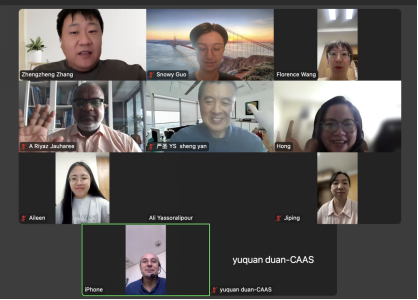
Session Four:
Maryia Samakhavets, Belarus, Polessky State University – Associate Professor
Vesna Mrdalj, Bosnia and Herzegovina, University of Banja Luka – Head, Dept. of Agricultural Economics and Rural Development
Myanmar: Theingi Myint, Professor and Head of Department of Agricultural Economics, Yezin Agricultural University
India: Shoba Suri, Senior Researcher, Health Initiative Project, Observer Research Foundation
China: Duan Yuquan, Researcher, Chinese Academy of Agricultural Sciences; Member of the Academic Committee, Institute of Agro-Products Processing Science and Technology
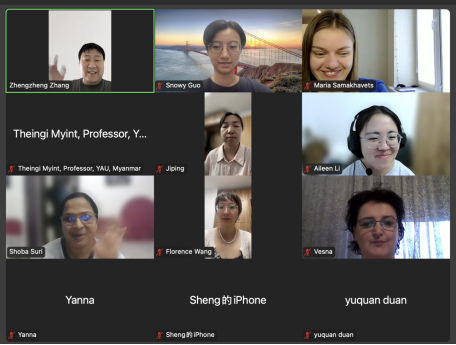
Session Five:
Chile: Ernesto DR Santibanez Gonzalez, Professor, CES4.0, University of Talca
Bulgaria: Damyan Kirechev, University of Economics – Varna – Chief Assistant Professor
Malta: Margaret Camilleri Fenech, University of Malta – Lecturer
Tanzania: Rashid Suleiman, Senior Lecturer and Head, Department of Food Science and Agro-Processing, Sokoine University of Agriculture
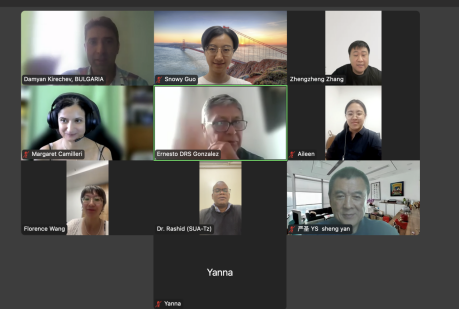
Session Six:
Mexico: Alicia Paulina Cárdenas Castro, Instituto Tecnológico de Durango (Technological Institute of Durango, National Technological Institute of Mexico) – Postdoctoral Researcher
Mexico: Sonia Guadalupe Sáyago Ayerdi, Tecnológico Nacional de México / Instituto Tecnológico de Tepic – Professor
Jamaica: Sylvia Mitchell, Senior Lecturer, The Caribbean Centre for Research in the Bioscience, Biotechnology Unit, Faculty of Science and Technology, University of the West Indies (Caribbean)
Costa Rica: Mélanie Pérez-Vargas, Bachelor of Agricultural Sciences, EARTH University
Trinidad and Tobago: Saheeda Mujaffar, Senior Lecturer, Department of Chemical Engineering, The University of the West Indies (UWI)
United Kingdom: Steven J. Wearne, SJW Consultancy – Independent Consultant
Denmark: Henning Otte Hansen, PhD in Agricultural Policy, MSc in Agronomy, and MSc in Business Economics
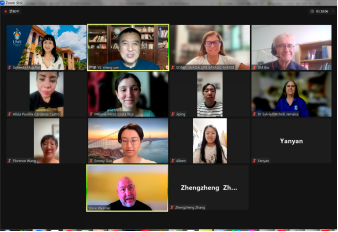
Session Seven:
Ecuador: Lourdes Noemí Guacho Sáez, World Vision Ecuador – Child and Adolescent Development Promoter
Panama: Jorge Carlos Hernández Jaén, Ministry of Agricultural Development
Dominican Republic: Melisa Ciprián, Food Security and Sustainable Food Systems Consultant
Honduras: Emma Sarahi Navarro Roque, Consultant – (Consultant for Women Producers’ Projects
Canada: Claude Caldwell, Professor Emeritus, Faculty of Agriculture, Dalhousie University
Honduras: Glenda Adabel Cano Arriola, Consultant – Socioeconomic and Planning Analyst
Honduras: Hilda Ruth Navarro Roque, Forestry Technician
China: Duan Yuquan, Researcher, Chinese Academy of Agricultural Sciences; Member of the Academic Committee, Institute of Agro-Products Processing Science and Technology
China: Sheng Jiping, Professor, School of Agricultural and Rural Development, Renmin University of China
China: Shen Lin, China Agricultural University
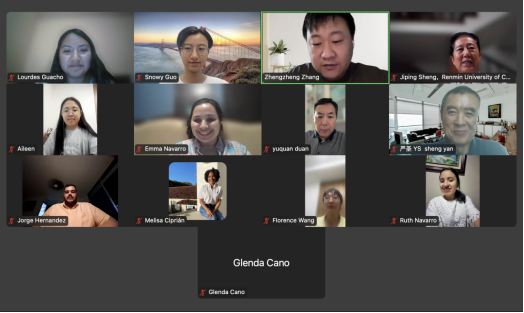
Session Eight:
Philippines: Christina A. Gabrillo, Visayas State University – Professor
Bangladesh: Md Mahmodol Hasan, Professor, Department of Agronomy and Agricultural Extension, University of Rajshahi
Romania: Iulia Dragut, Cultural Association EuroEast – Alternative – President
Fiji: Philip Sagero, The University of the South Pacific – Lecturer of Physical Geography
Indonesia: Sri Fatimah, University of Padjadjaran, Faculty of Agriculture – Associate Professor
Timor-Leste: Delfim da Costa, Universidade Nacional Timor Lorosa’e – Senior Lecturer
Uzbekistan: Fotima Saydullaeva, Senior Teacher, Samarkand Agroinnovations and Research University
Morocco: Victor Ongoma, Assistant Professor in Climate Change Adaptation, Mohammed VI Polytechnic University
Malawi: Shukulani Georgia Nyirenda, Program Officer, National Youth Network on Climate Change and Agriculture
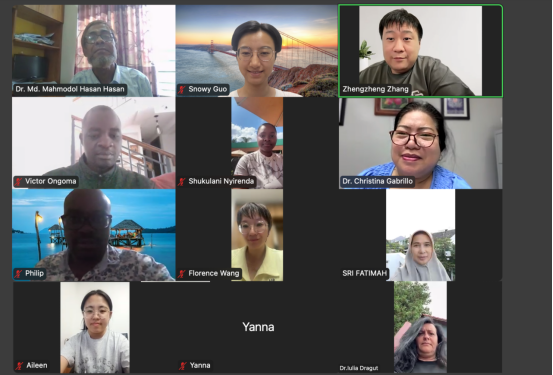
Contact Person: Mr Zhang E-mail: Secretariat@shiology.world